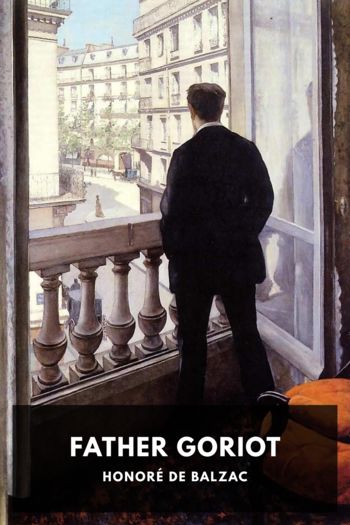Father Goriot by Honoré de Balzac (books to read for beginners txt) 📕

Description
Father Goriot, today considered one of Balzac’s most important works, is part of his novel sequence The Human Comedy. It’s the first of Balzac’s novels to feature recurring characters, a technique that he famously developed in his subsequent novels.
Set in Paris during the Bourbon Restoration of the early 1800s, Father Goriot follows Eugène de Rastignac, a student born to noble roots but little means, as he tries to climb the social ladder in Paris. The impoverished Goriot is staying at the same boardinghouse as Rastignac—and Rastignac sees opportunity in Goriot’s richly-married and elegant daughters.
The novel has been widely praised for its realist portrayal of Parisian life of various social classes, and its deep influence on French literature is still felt today. While it had chapter breaks when it was initially serialized, Balzac removed them when compiling his definitive edition of The Human Comedy, a change that is preserved in this edition.
Read free book «Father Goriot by Honoré de Balzac (books to read for beginners txt) 📕» - read online or download for free at americanlibrarybooks.com
- Author: Honoré de Balzac
Read book online «Father Goriot by Honoré de Balzac (books to read for beginners txt) 📕». Author - Honoré de Balzac
So when the servant announced M. Eugène de Rastignac, the Marquis d’Ajuda-Pinto trembled with joy. To be sure, a loving woman shows even more ingenuity in inventing doubts of her lover than in varying the monotony of his happiness; and when she is about to be forsaken, she instinctively interprets every gesture as rapidly as Virgil’s courser detected the presence of his companion by snuffing the breeze. It was impossible, therefore, that Mme. de Beauséant should not detect that involuntary thrill of satisfaction; slight though it was, it was appalling in its artlessness.
Eugène had yet to learn that no one in Paris should present himself in any house without first making himself acquainted with the whole history of its owner, and of its owner’s wife and family, so that he may avoid making any of the terrible blunders which in Poland draw forth the picturesque exclamation, “Harness five bullocks to your cart!” probably because you will need them all to pull you out of the quagmire into which a false step has plunged you. If, down to the present day, our language has no name for these conversational disasters, it is probably because they are believed to be impossible, the publicity given in Paris to every scandal is so prodigious. After the awkward incident at Mme. de Restaud’s, no one but Eugène could have reappeared in his character of bullock-driver in Mme. de Beauséant’s drawing-room. But if Mme. de Restaud and M. de Trailles had found him horribly in the way, M. d’Ajuda hailed his coming with relief.
“Goodbye,” said the Portuguese, hurrying to the door, as Eugène made his entrance into a dainty little pink-and-gray drawing-room, where luxury seemed nothing more than good taste.
“Until this evening,” said Mme. de Beauséant, turning her head to give the Marquis a glance. “We are going to the Bouffons, are we not?”
“I cannot go,” he said, with his fingers on the door handle.
Mme. de Beauséant rose and beckoned to him to return. She did not pay the slightest attention to Eugène, who stood there dazzled by the sparkling marvels around him; he began to think that this was some story out of the Arabian Nights made real, and did not know where to hide himself, when the woman before him seemed to be unconscious of his existence. The Vicomtesse had raised the forefinger of her right hand, and gracefully signed to the Marquis to seat himself beside her. The Marquis felt the imperious sway of passion in her gesture; he came back towards her. Eugène watched him, not without a feeling of envy.
“That is the owner of the brougham!” he said to himself. “But is it necessary to have a pair of spirited horses, servants in livery, and torrents of gold to draw a glance from a woman here in Paris?”
The demon of luxury gnawed at his heart, greed burned in his veins, his throat was parched with the thirst of gold.
He had a hundred and thirty francs every quarter. His father, mother, brothers, sisters, and aunt did not spend two hundred francs a month among them. This swift comparison between his present condition and the aims he had in view helped to benumb his faculties.
“Why not?” the Vicomtesse was saying, as she smiled at the Portuguese. “Why cannot you come to the Italiens?”
“Affairs! I am to dine with the English Ambassador.”
“Throw him over.”
When a man once enters on a course of deception, he is compelled to add lie to lie. M. d’Ajuda therefore said, smiling, “Do you lay your commands on me?”
“Yes, certainly.”
“That was what I wanted to have you say to me,” he answered, dissembling his feelings in a glance which would have reassured any other woman.
He took the Vicomtesse’s hand, kissed it, and went.
Eugène ran his fingers through his hair, and constrained himself to bow. He thought that now Mme. de Beauséant would give him her attention; but suddenly she sprang forward, rushed to a window in the gallery, and watched M. d’Ajuda step into his carriage; she listened to the order that he gave, and heard the Swiss repeat it to





Comments (0)